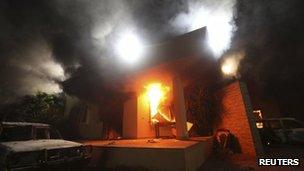US 'had no warning' of attack on Benghazi consulate
- Published

The US Department of State has said it had no "actionable intelligence" about plans for last month's deadly attack on the American consulate in Libya.
The 11 September Benghazi assault, in which the ambassador and three others died, was unprecedented in recent diplomatic history, officials added.
The incident is politically sensitive, just weeks ahead of the US elections.
State department officials are due to testify before Congress on Wednesday about their handling of the attack.
The BBC's Kim Ghattas in Washington says the detailed briefing appears to be an effort to preempt criticism the agency is expected to face from the panel.
The hearing is part of an investigation into the security situation in Benghazi leading up to the attack and is the first public inquiry on Capitol Hill into what went wrong.
The state department has launched its own internal review of events.
'Security requests denied'
Obama's ambassador to the United Nations, Susan Rice, initially described the attack as a "spontaneous" one that arose out of a protest against an inflammatory anti-Islam film.
But in Tuesday's briefing, unnamed officials from the state department said it had never concluded that the sacking of the mission was motivated by the US-made video ridiculing Muslims.
"That was not our conclusion," an official said.
They said it was instead a co-ordinated assault involving several groups of men armed with machine guns and rocket-propelled grenades over an expanse of more than a mile.
"There was no actionable intelligence of any planned or imminent attack," a top state department official said.
The official also told reporters: "It would be very, very hard to find a precedent for an attack like that in recent diplomatic history."
In addition to two state department officials scheduled to give evidence on Wednesday, two security officers who were posted in Libya until recently are also expected to testify.
They have both said the Department of State denied requests for extra security.
One officer, Eric Nordstrom, has said in a document to the congressional committee that a state department official, Charlene Lamb, had wanted to keep the security presence in Benghazi "artificially low".
Both are due to appear on Wednesday before the House Oversight and Government Reform Committee.
State department official Patrick Kennedy and Lt Col Andrew Wood, who was in charge of a security support team at the US embassy in Tripoli, will also give evidence.
As the 6 November presidential election looms, Republican presidential nominee Mitt Romney has used the Libyan attack to criticise President Barack Obama.
In a speech on Monday, Mr Romney called the Benghazi incident an example of the Democratic president's foreign policy weakness.
The Obama administration has said it provided its best intelligence on the attack, and amended that explanation as further information emerged.
Ambassador Christopher Stevens died of smoke inhalation when he was trapped alone in the burning consulate building. Three other officials were killed, and three wounded.
- Published16 November 2012
- Published13 September 2012